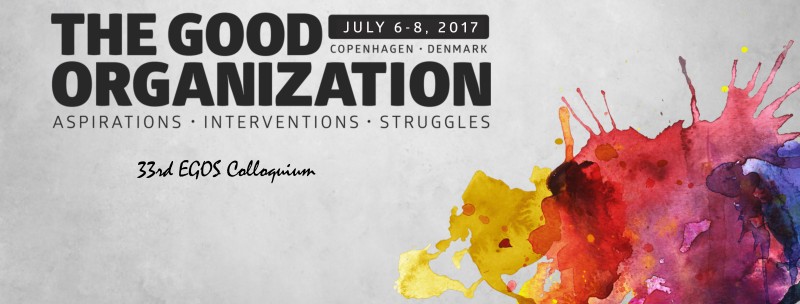Sub-theme 67: Experimenting Organization: Becoming by Doing
Call for Papers
Organizations, particularly those operating in the public sector, face high hopes and big pressures to do good but have
to deal with a variety of situated definitions of goodness (von Wright, 1972) that can cause frictions and leave organizational
members uncertain about the ‘right’ thing to do. In this sub-theme, we embrace the idea of the organization as a socio-ecological
space open to uncertainty, unknowingness and surprise and will explore what constituting such spaces means for organizations
that seek to learn and account for their actions. That is, what it means for organizations to be ‘experimental’.
Organizations are often depicted as ‘learning organizations’, indicating that they are ongoing improving entities, learning
from past failure, finding solutions to occurring problems and encapsulating these in new organizational procedures and routines
guiding ‘good’ or ‘improved’ organizational behavior. However, this view of organizational development ignores that doing
the right thing is not obvious or spelled out beforehand. Clegg et al. (2005) have bracketed the positivist view on organizational
development, pointing out that organizations should be seen as emergent and becoming, conceptualizing an organization as a
creative space in between order and chaos in which learning and organizing are seen as mutually constitutive, unstable and
pragmatic processes.
We want to expand views on organizational becoming by shifting focus from ‘thinking’
to experimenting and hence ‘doing’ in the socio-material context of organizations (Stoopendaal & Bal, 2013; Cabantous
et al., 2010; Gherardi & Perlotta, 2014; Orlikowsky & Scott, 2015). Experimenting organizations do not resist or attempt
to control ambiguity and uncertainty but rather embrace these by deliberately and recursively searching for reflexive and
situated responses or ‘experiments’ to challenges (Ferraro et al., 2015). Experiments are iterative and collaborative practices
of seeking answers in the course of problem solving (Sabel & Zeitlin, 2012). Experimenting organizations create new spaces
to navigate, as a journey with no fixed route (Clegg et al., 2005).
Experimenting is a way of becoming aware
of the world in which we live; it is, for instance, the essence of the ethnomethodological approach to understanding the norms
and tacit rules of everyday life (Garfinkel, 1967). Organizations and the people in and around them are not aware of what
they can do other than by testing the limits to their being what they are and becoming whatever they might be. Yet, experimenting
does not mean that organizations ‘act in the wild’; organizations still must be willing to account for their activities in
situated contexts. Experimenting evokes justification work (Boltanski & Thévenot, 2006) as well as practices of generative
accountability (Jerak-Zuideren,t 2015).
Drawing on the pragmatist turn in organizational theory, we advocate
an approach that is ambiguous and participative instead of heroic and descriptive, focusing on the concrete and everyday ‘doings’
of and within organizations. Experimenting means intervening, manipulating, selecting and participating – uncovering
not only ‘the other’, but also the experimenter herself (Hacking, 1983). Through manipulating and thus ‘changing’ (i.e. tinkering
with, probing), the very nature of the organization and its activities become visible, urging the experimenter to become aware
and reflect upon the organization’s intentions and values, as well as those of members. Organizations, in this way, can be
analyzed as value-ridden, multiple and reflexive, thus uncovering various modes of existence.
In this panel
we warmly invite papers that explore and theorize the ‘Experimenting Organization’, focusing on both organizations themselves
and actors within; i.e. managers, practitioners, staff, workers. We are interested in:
- How experimenting occurs
- How experimenting compromises conflicting values into ‘goods’
- The role of materialities in the ways experiments are enacted
- How organizations account for these processes, leading to situated and relational forms of accounting for organizational behavior
- What the experimental organization means for the role of the researcher: if experimenting is central to organizational life, can researchers still stand on the outside and watch, or are they implicated in the experiment; if so, does this need a refocus of their role into something more ‘interventionist’ (Zuiderent-Jerak, 2015)? What kinds of affective or formative methodologies are required for doing so (e.g. Iedema et al., 2013; Iedema & Carroll, 2015; Gherardi & Perotta, 2014)?
References
- Boltanski, L., & Thévenot, L. (2006): On Justification: Economies of Worth. Princeton: Princeton University Press.
- Cabantous, L., Gond, J.P., & Johnson-Cramer, M. (2010): “Decision theory as practice: crafting rationality in organizations.” Organization Studies, 31 (11), 1531–1566.
- Clegg, S.R., Kornberger, M., & Rhodes, C. (2005): "Learning/Becoming/Organizing." Organization, 12 (2), 147–167.
- Ferraro, F., Etzion, D., & Gehman, J. (2015): “Tackling grand challenges pragmatically: robust action revisited.” Organization Studies, 36 (3), 363–390.
- Garfinkel, H. (1967): Studies in Ethnomethodolgy. New York: Prentice Hall.
- Gherardi, S., & Perrotta, M. (2014): “Between the hand and the head: How things get done, and how in doing the ways of doing are discovered.” Qualitative Reserach in Organizations and Management: An International Journal, 9 (2), 134–150.
- Hacking, I. (1983): Representing and Intervening: Introductory Topics in the Philosophy of Natural Science. Cambridge: Cambridge University Press.
- Iedema, R., & Carroll, K. (2015): “Research as affect-sphere: towards spherogenics.” Emotion Review, 7 (1), 67–72.
- Iedema, R., Mesman, J., & Carroll, K. (2013): Visualising Health Care Practice Improvement: Innovation from Within. Milton Keynes: Radcliffe.
- Jerak-Zuiderent, S. (2015): “Accountability from Somewhere and for Someone: Relating with Care.” Science as Culture, 24 (4), 412–435.
- Orlikowski, W.J., & Scott, S.V. (2015): “Exploring material-discursive practices.” Journal of Management Studies, 52 (5), 697–705.
- Sabel, C.F., & Zeitlin, J. (2012): “Transnational transformations: the emergence of experimentalist governance.” In: D. Levi-Faur (ed.): The Oxford Handbook of Governance. Oxford: Oxford University Press, 169–183.
- Stoopendaal, A., & Bal, R. (2013): “Conferences, tablecloths and cupboards: How to understand the situatedness of quality improvements in long-term care.” Social Science & Medicine, 78, 78–85.
- von Wright, G.H. (1972): The Varieties of Goodness. New York: Routledge/Humanities Press.
- Zuiderent-Jerak, T. (2015): Situated Intervention. Sociological experiments
in health care. Cambridge, MA: MIT Press.


